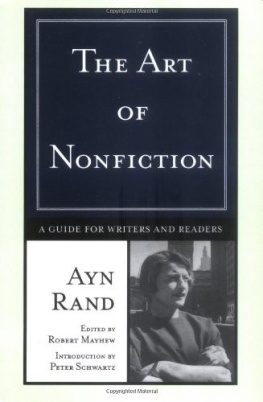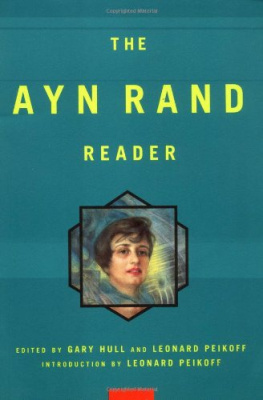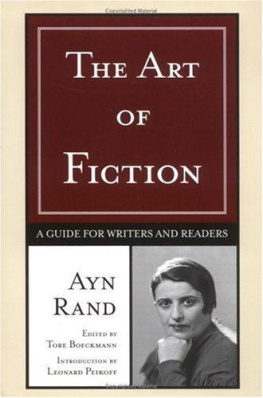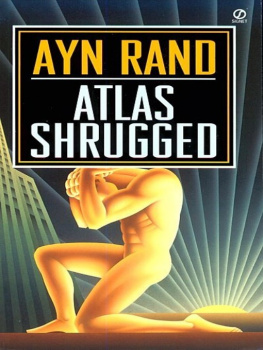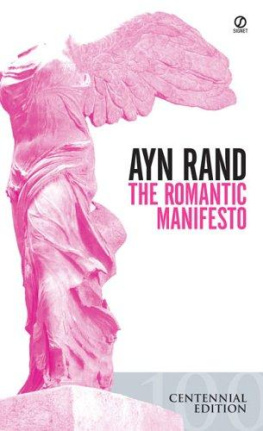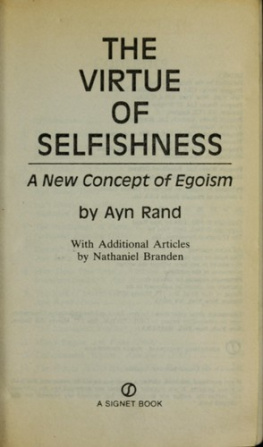Ayn Rand - Collected Works of Ayn Rand
Here you can read online Ayn Rand - Collected Works of Ayn Rand full text of the book (entire story) in english for free. Download pdf and epub, get meaning, cover and reviews about this ebook. year: 0, genre: Art. Description of the work, (preface) as well as reviews are available. Best literature library LitArk.com created for fans of good reading and offers a wide selection of genres:
Romance novel
Science fiction
Adventure
Detective
Science
History
Home and family
Prose
Art
Politics
Computer
Non-fiction
Religion
Business
Children
Humor
Choose a favorite category and find really read worthwhile books. Enjoy immersion in the world of imagination, feel the emotions of the characters or learn something new for yourself, make an fascinating discovery.
Collected Works of Ayn Rand: summary, description and annotation
We offer to read an annotation, description, summary or preface (depends on what the author of the book "Collected Works of Ayn Rand" wrote himself). If you haven't found the necessary information about the book — write in the comments, we will try to find it.
Collected Works of Ayn Rand — read online for free the complete book (whole text) full work
Below is the text of the book, divided by pages. System saving the place of the last page read, allows you to conveniently read the book "Collected Works of Ayn Rand" online for free, without having to search again every time where you left off. Put a bookmark, and you can go to the page where you finished reading at any time.
Font size:
Interval:
Bookmark:

Table of Contents
WE THE LIVING
published in 1936, was Ayn Rands first novel, and it has gone on to sell nearly two million copies in the mass market edition.
The theme of We the Living is one of the most significant of our timethe struggle of the individual against the state. It portrays the impact of the Russian Revolution on three human beings who assert the right to live their own lives and pursue their own happiness. It tells of a womans passionate love, held like a fortress against the corrupting evil of a totalitarian state, which demands from its citizens not independence but self-sacrifice.

New American Library
Published by New American Library, a division of
Penguin Group (USA) Inc., 375 Hudson Street,
New York, New York 10014, USA
Penguin Group (Canada), 90 Eglinton Avenue East, Suite 700, Toronto,
Ontario M4P 2Y3, Canada (a division of Pearson Penguin Canada Inc.)
Penguin Books Ltd., 80 Strand, London WC2R 0RL, England
Penguin Ireland, 25 St. Stephens Green, Dublin 2,
Ireland (a division of Penguin Books Ltd.)
Penguin Group (Australia), 250 Camberwell Road, Camberwell, Victoria 3124,
Australia (a division of Pearson Australia Group Pty. Ltd.)
Penguin Books India Pvt. Ltd., 11 Community Centre, Panchsheel Park,
New Delhi - 110 017, India
Penguin Group (NZ), 67 Apollo Drive, Rosedale, North Shore 0632,
New Zealand (a division of Pearson New Zealand Ltd.)
Penguin Books (South Africa) (Pty.) Ltd., 24 Sturdee Avenue,
Rosebank, Johannesburg 2196, South Africa
Penguin Books Ltd., Registered Offices:
80 Strand, London WC2R 0RL, England
First New American Library Printing, May
Copyright Ayn Rand OConnor, 1936, 1959
Copyright renewed Ayn Rand OConnor, 1964
Copyright Eugene Winick, Paul Gitlin, Leonard Peikoff, 1987
Introduction copyright Leonard Peikoff, 2009
Afterword copyright Leonard Peikoff, 1995, 2009
All rights reserved
Information about other books by Ayn Rand and her philosophy, Objectivism, may be obtained by writing to OBJECTIVISM, PO Box 51808, Irvine, California 92619.
 REGISTERED TRADEMARKMARCA REGISTRADA
REGISTERED TRADEMARKMARCA REGISTRADA
Set in Adobe Garamond
Without limiting the rights under copyright reserved above, no part of this publication may be reproduced, stored in or introduced into a retrieval system, or transmitted, in any form, or by any means (electronic, mechanical, photocopying, recording, or otherwise), without the prior written permission of both the copyright owner and the above publisher of this book.
PUBLISHERS NOTE
This is a work of fiction. Names, characters, places, and incidents are either the product of the authors imagination or are used fictitiously, and any resemblance to actual persons, living or dead, business establishments, events, or locales is entirely coincidental.
The publisher does not have any control over and does not assume any responsibility for author or third-party Web sites or their content.
The scanning, uploading, and distribution of this book via the Internet or via any other means without the permission of the publisher is illegal and punishable by law. Please purchase only authorized electronic editions, and do not participate in or encourage electronic piracy of copyrighted materials. Your support of the authors rights is appreciated.
eISBN : 978-1-101-13766-6
http://us.penguingroup.com
Introduction
AS AYN RAND SAYS IN HER FOREWORD, We the Living is not a novel about Soviet Russia, which is only the backdrop of the story. The novels events, characters, and outcome are selected not by their relation to history, but to philosophy, which means that the books theme is universal. The theme is the evil of totalitarianism, a species of depravity not restricted to any country or century.
The basic cause of totalitarianism is two ideas: mens rejection of reason in favor of faith, and of self-interest in favor of self-sacrifice. If this is a societys philosophical consensus, it will not be long before an all-powerful Leader rises up to direct the faith and sacrifice that everyone has been extolling. His subjects cannot resist his takeover, neither by exercising their faculty of thought nor their passion for values, because these are the two priceless possessions they have given up. The end result is thought control, starvation, and mass slaughter.
Because of the Greeks commitment to reason, worldly happiness, and (relative) freedom, the above causal sequence was absent for centuries from the West. Then Christianity took over, demanding of menwith full consistency for the first timea life of faith and sacrifice. Although delayed by primitive technology, the result came soon enough: the infallible Pope, the plummeting life span, and the elimination of unapproved thought by the Inquisition.
The highest-ranking Christians in Europe were the first practitioners of Western totalitarianism. It was they who discovered the essence of a new kind of State, and offered it to the future as a possibility to consider.
At last, there was a Renaissance, and then the Wests long struggle toward the Enlightenment with its commitment to reason and the pursuit of happiness, and its ridicule of Christianity. The result was the freest country in history, America. It did not last, however, because nineteenth-century intellectuals, followers of Kant, rejected the ideas of the Enlightenment in favor of new forms of unreason and unselfishness. Within only a few generations, cause led to effect: totalitarians of every stripe sprang up, each claiming this time to be secular and scientific even as all worked diligently to reproduce the medieval model.
Totalitarian states differ in every detail, but not in their nature and cause. And in regard to details, what difference do their differences make? What does it matter to the victims if the infallible leader claims messages from the supernatural or from an unperceivable dialectic? If he demands sacrifice for Corpus Christi or for the proletariat? If the people are made to raise their hands in prayer or their feet in goose steps? If the killer troops wear black gowns or red shirts? If those out of favor are ripped open by knives in Spain or left to freezing starvation in the gulags? States like these often pose as enemies of one another, but the pose is tactics, not truth.
An eloquent example of the truth is what happened to We the Living under Mussolini. During World War II, the novel was pirated by an Italian film company, which produced a movie version without the knowledge or consent of AR. Because of its length, the picture was released in 1942 as two separate movies, Noi Vivi ( We the Living ) and Addio Kira ( Farewell Kira ). Both were enormous popular successes. The fascist government had approved the movie on the grounds that it was anti-Communist. But the public, like the director, understood at once that the movie was just as antifascist as anti-Communist. People grasped ARs broader theme and embraced the two movies, in part as a way of protesting their oppression under Mussolini. In a takeoff on the titles, people began referring to themselves as Noi Morti (We the Dead), and to Mussolinis economic policies as Addio, Lira . Five months after its release, the government figured out what everyone else knew and banned the movie. These events alone are eloquent proof that We the Living is not merely about Soviet Russia.
Font size:
Interval:
Bookmark:
Similar books «Collected Works of Ayn Rand»
Look at similar books to Collected Works of Ayn Rand. We have selected literature similar in name and meaning in the hope of providing readers with more options to find new, interesting, not yet read works.
Discussion, reviews of the book Collected Works of Ayn Rand and just readers' own opinions. Leave your comments, write what you think about the work, its meaning or the main characters. Specify what exactly you liked and what you didn't like, and why you think so.

